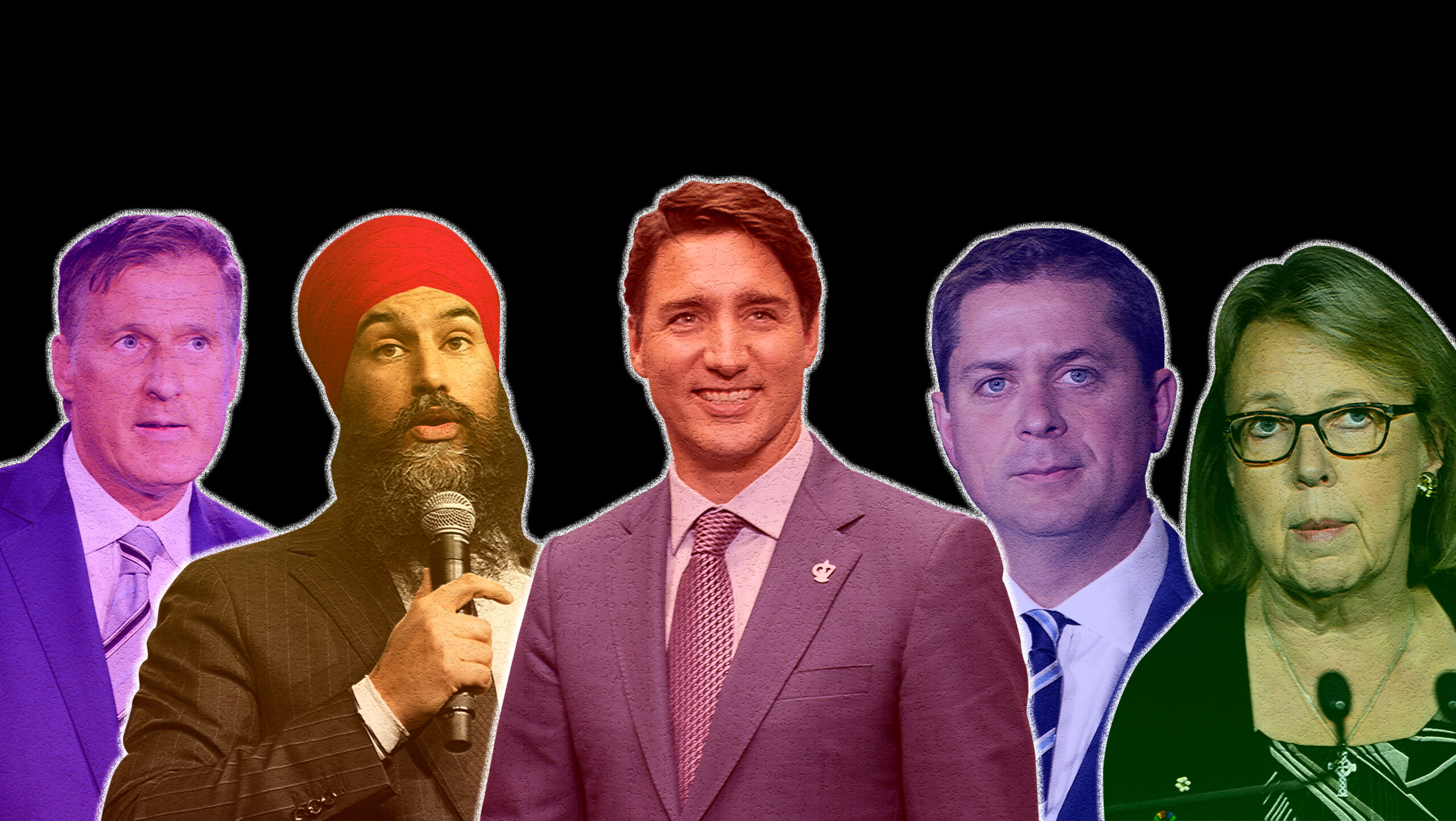This story is part of Salty Queers, quick takes on the pop culture and political news that has us marinating in bitterness.
Folks, we’re just 10 days into the federal election campaign, and we’ve already seen enough poor decision-making to shake us to our core—from old speeches comparing gay marriage to dog anatomy, to anti-abortion flip-flopping to, oh yeah, blackface.
And with every bad choice comes an inevitable apology: the expressions of deep regret, of absolute remorse—or in some cases, the sorry-not-sorry.
Here’s a special edition of Salty Queers where we bring out receipts and clock party leaders’ bad choices.
Andrew “sorry-not-sorry” Scheer

Liberal leader Justin Trudeau’s blackface debacle this week has given Conservative leader Andrew Scheer the opportunity to play Keanu Reeves in The Matrix, dodging the bullets regarding his previous choices. But guess what? He needs to try harder because the queers are watching and we never forget.

Last month, Public Safety Minister Ralph Goodale released a video from 2005 of then–25-year-old Scheer explaining why he’s opposed to the Civil Marriage Act. In the video, the MP from Regina-Qu’Appelle said, “There is nothing more important to society than the raising of children, for its very survival requires it. Homosexual unions are by nature contradictory to this… Two members of the same sex may use their God-given free will to engage in acts, to co-habit and to own property together… In that sense, they have many of the collateral features of marriage, but they do not have its inherent feature, as they cannot commit to the natural procreation of children. They cannot, therefore, be married.”
“How many legs would a dog have if you counted the tail as a leg? The answer is just four,” Scheer continued—and successfully proved he could count. “Just because you call a tail a leg doesn’t make it a leg. If this bill passes, governments and individual Canadians will be forced to call a tail a leg, nothing more.”
When asked in August to comment on his 2005 statement, Scheer refused to do so. He did not explain, renounce or apologize for his remarks. On Thursday, after the release of Trudeau’s blackface photos, Scheer was asked in a press conference at Saint Hyacinthe, Que., if he should apologize for his 2005 speech. Again, he declined and said the conversation is about Trudeau.
There seems to be a disconnect: Earlier, Scheer, in an effort to do some damage control after homophobic and racist social media posts of some from his party’s candidates resurfaced, had said: “As long as someone takes responsibility for what they’ve said, and addresses the fact that in 2019 some things that may have been said in the past are inappropriate today, that if anything that they’ve ever said in the past caused any type of hurt or disrespect to one community or another and have apologized for that, I accept that.”
On Friday, Scheer was once again asked about his same-sex marriage comment during an appearance in Saint John, NB. Once again, he responded: “I addressed that speech. That is over for me.” Except, he didn’t. Instead, he channelled Demi Lovato and said “sorry not sorry.”

When news of Trudeau in blackface broke, Scheer told reporters that the Liberal leader’s actions were just as racist in 2001 as they are in 2019. He added that Trudeaushowed a “lack of judgment and integrity and someone who’s not fit to govern the country.”
But how will Scheer handle the same dirt in his own backyard? Photos of the Conservative candidate for Cloverdale-Langley City smiling and posing in blackface at an event have recently emerged. Will Scheer deem her fit to govern? Will sorry be enough?
Justin “I can’t remember how many times I’ve done blackface” Trudeau

Trudeau is known, in Canada and abroad, for being a progressive leader: He attends the parades and visits gay bars during Pride season. He’s been welcoming of all diverse people. He greeted Syrian refugees at the airport upon their arrival to Canada.
…Except he’s really not a woke PM. This week, photos and a video of Trudeau in black- and brownface surfaced. The Liberal leader admitted to wearing blackface not once, not twice, but three times (and maybe more—he says he’s reluctant to give a figure in case there are incidents he has forgotten).

The first image, leaked by Time magazine, showed a then–29-year-old Trudeau dressed in what he called an Aladdin costume, donning brownface during an “Arabian Nights”-themed gala at the Vancouver private school where he taught at the time. Talking to reporters on his plane, Trudeau also admitted to wearing blackface while performing the Jamaican folk song “Day-O” at a high-school talent show. Hours later, Global News unveiled a video from the early 1990s of the Liberal leader in full-body dark makeup. (You can find our full coverage of the incidents here.)
Now, the Liberal cries that a vote for Trudeau is a vote for a progressive, diverse government—one in direct opposition to Scheer’s Conservatives—are ringing hollow to some Canadians.

It’s not the first time Trudeau has been called racially insensitive. In 2018, during a visit to India, Trudeau—and his entire family—dressed up in traditional Indian clothing for multiple photo ops. “His outfits have just been so…extra,” the BBC’s Ayeshea Perera wrote of the PM’s fashion choices. The Liberal leader also faced criticism for his cringey bhangra dance in 2014—a move journalist Sadiya Ansari has described as “a white politician who ‘screws in the lightbulb’ in an attempt to lockdown the so-called ‘ethnic vote.’” Yikes.
Elizabeth “flip-flop” May

The Green Party may be taking the most progressive stance on climate change, but it’s hard to say the same when it comes to social issues—and leader Elizabeth May has had her fair share of blunders over this short election campaign.
In an interview with CBC’s Vassy Kapelos on Sept. 9, May said Green MPs would be able to re-open the abortion debate, reigniting years-long talks about the Green leader’s position on the issue altogether. The Green Party later retracted the statement, claiming that while it would not whip MPs on any vote, the party does not “have people who would want to reopen the abortion debate,” according to May. (May dodged Kapelos’s question about her personal views on same-sex marriage in the same interview, though the Green Party has historically supported LGBTQ2 people, including having once had an openly gay leader.)
Just days earlier, several NDP candidates in New Brunswick defected to the Green Party. One defector, Jonathan Richardson, cited racism as a reason the NDP couldn’t secure more candidates in Atlantic Canada, claiming that it was too difficult to run for a party whose leader—Jagmeet Singh—is Sikh and wears a turban. When May was called on to explain why her party would accept candidates with racist beliefs about Singh, the Green leader said Richardson’s comments were “taken out of context,” and that there wasn’t room for racism in the party.
But that sentiment was quickly undermined. After revelations of Trudeau wearing blackface emerged, May retweeted a tweet suggesting that Canadians focus more on climate change, “something that actually matters to the future of every single human.” While May deleted the retweet, the original tweet remains liked from her account.
Just 12 percent of the Green Party’s candidates are visible minorities, compared to 32 percent of NDP candidates, 20 percent of Liberal candidates and 18 percent of Conservative candidates.
To date, May has yet to apologize for anything but calling Jesus Christ her personal hero.
Maxime “Jordan Peterson fanboy” Bernier

Maxime Bernier can definitely hang out with May as they flip-flop on social issues together. However, Bernier is a “starmaker” (star is subjective ). As he notably said, if it weren’t for a bill he supported we wouldn’t have experienced the rise of the entitled, stubborn white-man Jordan Peterson, a YouTuber and University of Toronto professor who refuses to use gender-neutral pronouns.
A quick background: In 2016, Bernier initially supported the passing of Bill C-16—the Liberal bill that former Justice Minister Jody Wilson-Raybould described as a law that would “ensure Canadians are free to identify themselves and to express their gender as they wish while being protected against discrimination and hate.”
Then in 2017, less than a year after the bill’s passing, Bernier issued a statement reversing his support, saying: “If the vote were held again today, I would vote against it.”
This decision was influenced by his meeting with Peterson. In a statement, Bernier wrote: “Prof. Peterson believes that if adopted, C-16 will, in conjunction with the Ontario Human Rights Code, become a clear threat to [freedom of expression].” Under the Human Rights Code, misgendering someone is seen as discrimination.
In an interview with commentator Mark Steyn, Bernier talked about his change of heart. “When I voted for that, I thought that this bill won’t have any impact on the freedom of speech,” he said after Steyn asked him about his decision to reverse his support. “I had a nice chat and a nice briefing with [Peterson]…The impact on free speech is enormous.”
In the same interview, Bernier also kind of implied that Peterson should credit him for his fame: “That professor was notable because of that deal that I voted for—and I think it was a mistake that I voted for.”
Consistent with his brand, Bernier also has a history of flip-flopping on same-sex marriage. When he was first elected as a Conservative MP in the Quebec riding of Beauce in 2006, Bernier was among MPs who voted in favour of Motion 12, which would have re-opened the debate on the definition of marriage as a union between a man and a woman. But 10 years later, Bernier was seen marching in the Toronto Pride parade after the Conservatives decided to change its party definition of marriage and finally took a positive position on LGBTQ2 rights in Canada. To this day, Bernier still brags how he supported the removal of the Conservative definition of marriage three years ago.

After the Trudeau-in-blackface photos appeared this week, Bernier was busy being, well, himself and resurfaced his tweet calling out the “government-sponsored leftist logic” that equates diversity to “men wearing female dress and makeup.”
Meanwhile, when asked how many LGBTQ2 candidates are running under his party, Bernier answered: “We don’t keep track of such things in our candidates’ database. Or their religion, skin colour, or even sex. They’re all individual Canadians fighting for a better Canada.” Last month, Bernier also said he doesn’t want to promote more diversity because it will destroy our “great country.” What a man.
Jagmeet “to follow” Singh

We have to give it up to NDP leader Jagmeet Singh: While he was criticized for speaking at a Sikh independence rally in 2015, he’s so far avoided making a poor decision on matters related to race, gender identity or sexuality in the 2019 election campaign. In fact, the NDP is among the most diverse party in the race, with the most LGBTQ2 candidates running and 30 percent of candidates identifying as racialized or people of colour.
But if the last week and a half of campaigning has taught us anything, it’s that there’s still plenty of time to take a wrong step. We’re watching, Singh. Don’t screw up.
This story is part of Salty Queers, quick takes on the pop culture and political news that has us marinating in bitterness.




 Why you can trust Xtra
Why you can trust Xtra


